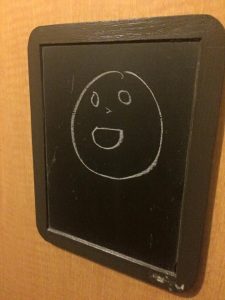ALISE 2015: Breaking down silos, pouring coffee
Last week, I had the opportunity to attend the ALISE 2015 conference in Chicago. ALISE is the Association for Library and Information Science Education. Its members are LIS faculty members, and the research presented mostly focuses on issues related to LIS education. It’s also perhaps the most important place for new PhD graduates (or for those who are almost finished with their PhD) to have preliminary interviews for LIS faculty positions.
This year’s theme was “Mirrors & Windows: Reflections on Social Justice & Re-imagining LIS Education.” Many of the sessions covered issues related to those interested in social justice, such as how to provide information services to traditionally under-served groups and how to handle gender and color differences in teaching and learning. Although the theme might sound narrow at first glance, it actually is something that affects both practitioners and faculty members in LIS, because everything we do has the potential to touch marginalized topics and groups. I hope I’m not violating any copyright rules by posting this, but this cute, bold, and useful card was provided in the conference packets:

The closing speaker was Saskia Sassen, a sociologist who based her talk on her new book, Expulsions: Brutality and Complexity in the Global Economy. For me, the most memorable part of her enjoyable but disturbing talk were slides she provided about which entities control the wealth in the world. (Think 1%). It helped me understand a little more about why it has been so difficult for hard-working people to pay for living expenses, especially around the time of the housing crash a few years back. I’m glad I attended the talk, but now I’m questioning all the banks even more!
I was honored to serve as an invited panelist in the opening plenary session, entitled “The Space Between Us: A Conversation with Association Leadership About the Future of LIS Education.” As the name implies, the panel featured leaders from both practitioner and academic professional associations that are either in LIS or related to LIS. Tula Giannini from the Pratt Institute and Sam Hastings from the University of South Carolina moderated the panel. Here is a list of the panelists:
- Sandy Hirsh (Professor and Dean, San Jose State University; ASIS&T President)
- Clara M. Chu (Professor, UNC Greensboro; ALISE President)
- Ronald Larsen (Professor and Dean, Pittsburgh; iSchool Caucus Representative)
- Barbara Di Eugenio (Acting Director of Graduate Studies and Professor, Department of Computer Science, University of Illinois, Chicago)
- Courtney Young (Head Librarian and Professor, Penn State Univ.; ALA President)
- Amy Cooper Cary (Marquette University; Society of American Archivists)
- Diane Rasmussen Pennington (Ashford University, CAIS Vice-President)
And here are some of the points made in the panel, based on my sloppy, disjointed notes:
- Sandy noted how ASIS&T’s recent name change reflects its push for internationalization, and how its Information Professionals Task Force is making plans to unite the profession.
- Clara discussed the need to stop “siloing” our professional associations.
- Ronald presented his statistical analysis demonstrating that there is an increased demand for non-traditional LIS candidates such as Data Analyst, and a decreased demand for traditional LIS positions such as Reference Librarian.
- Barbara said that computer science suffers from public misconception. (Hint: it’s not all about programming!) She suggested looking into the Computing Research Association and CSAB accreditation.
- Courtney said ALA accreditation is in place to make sure that our schools are effectively moving forward through strategic planning, and that LIS education should include a balance of research, theory, and practice.
- Amy emphasized the importance of technical education in archivist training. Fewer Baby Boomer retirements than expected and job cuts are factors that are making it difficult for new archivists to find jobs.
- Finally, I suggested the need to describe the field differently to prospective students so they would better understand the realities of LIS practice, such as the importance of technical skills, assertive communication skills, and continuous adaptation.
We had a respectable amount of time for discussion after we presented our initial comments. Several audience members brought up great points. We probably could have talked all day, but it was lunchtime. I believe these issues need to become action items rather than just discussion items! The changing nature of the field is undeniable, and our degree programs need to reflect our evolution. Our professional associations can work together and draw on their respective strengths to make sure that our LIS education programs are meeting the needs of students and employers, but exactly how this can be done still seems to be in question. Please provide any ideas you have in the comments!
On a much less challenging note, I didn’t stay at the conference hotel. Instead, I stayed at an amazing boutique hotel a few blocks away called the ACME Hotel Company. It was so amazing, I would even recommend taking a trip to Chicago for the sole purpose of staying at this place. Each room had a chalkboard on its door, so I practiced my artistic skills one night:

And this note was in my room:

Sure enough, I had a thermos of hot, delicious coffee waiting for me at my requested time each morning. The delivery person placed the thermos on the ground, knocked on my door, and walked away, which meant I could grab my thermos and start ingesting my caffeine before looking presentable. The hotel provided real cream and Truvia packets (my favorite sweetener) in my room.
Come to think of it… can I go back?
